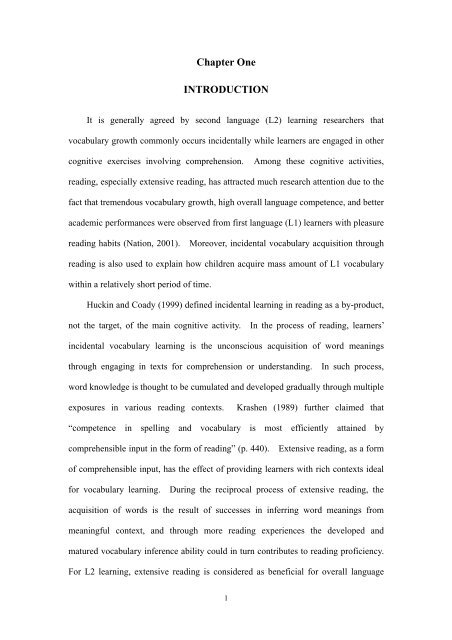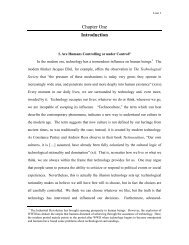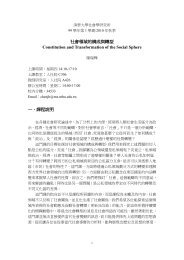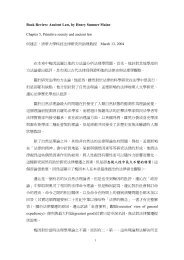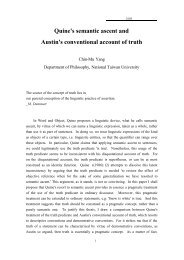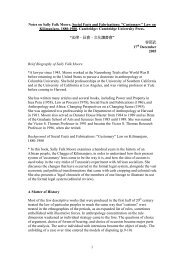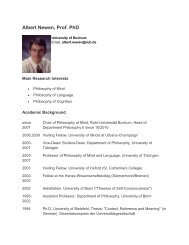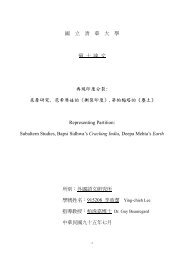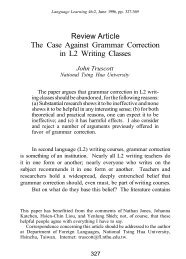Effects of Graded Texts on EFL College Students' Incidental ...
Effects of Graded Texts on EFL College Students' Incidental ...
Effects of Graded Texts on EFL College Students' Incidental ...
Create successful ePaper yourself
Turn your PDF publications into a flip-book with our unique Google optimized e-Paper software.
Chapter One<br />
INTRODUCTION<br />
It is generally agreed by sec<strong>on</strong>d language (L2) learning researchers that<br />
vocabulary growth comm<strong>on</strong>ly occurs incidentally while learners are engaged in other<br />
cognitive exercises involving comprehensi<strong>on</strong>. Am<strong>on</strong>g these cognitive activities,<br />
reading, especially extensive reading, has attracted much research attenti<strong>on</strong> due to the<br />
fact that tremendous vocabulary growth, high overall language competence, and better<br />
academic performances were observed from first language (L1) learners with pleasure<br />
reading habits (Nati<strong>on</strong>, 2001). Moreover, incidental vocabulary acquisiti<strong>on</strong> through<br />
reading is also used to explain how children acquire mass amount <str<strong>on</strong>g>of</str<strong>on</strong>g> L1 vocabulary<br />
within a relatively short period <str<strong>on</strong>g>of</str<strong>on</strong>g> time.<br />
Huckin and Coady (1999) defined incidental learning in reading as a by-product,<br />
not the target, <str<strong>on</strong>g>of</str<strong>on</strong>g> the main cognitive activity. In the process <str<strong>on</strong>g>of</str<strong>on</strong>g> reading, learners’<br />
incidental vocabulary learning is the unc<strong>on</strong>scious acquisiti<strong>on</strong> <str<strong>on</strong>g>of</str<strong>on</strong>g> word meanings<br />
through engaging in texts for comprehensi<strong>on</strong> or understanding. In such process,<br />
word knowledge is thought to be cumulated and developed gradually through multiple<br />
exposures in various reading c<strong>on</strong>texts. Krashen (1989) further claimed that<br />
“competence in spelling and vocabulary is most efficiently attained by<br />
comprehensible input in the form <str<strong>on</strong>g>of</str<strong>on</strong>g> reading” (p. 440). Extensive reading, as a form<br />
<str<strong>on</strong>g>of</str<strong>on</strong>g> comprehensible input, has the effect <str<strong>on</strong>g>of</str<strong>on</strong>g> providing learners with rich c<strong>on</strong>texts ideal<br />
for vocabulary learning. During the reciprocal process <str<strong>on</strong>g>of</str<strong>on</strong>g> extensive reading, the<br />
acquisiti<strong>on</strong> <str<strong>on</strong>g>of</str<strong>on</strong>g> words is the result <str<strong>on</strong>g>of</str<strong>on</strong>g> successes in inferring word meanings from<br />
meaningful c<strong>on</strong>text, and through more reading experiences the developed and<br />
matured vocabulary inference ability could in turn c<strong>on</strong>tributes to reading pr<str<strong>on</strong>g>of</str<strong>on</strong>g>iciency.<br />
For L2 learning, extensive reading is c<strong>on</strong>sidered as beneficial for overall language<br />
1


